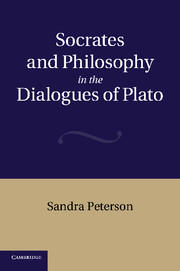Book contents
- Frontmatter
- Contents
- Acknowledgments
- Abbreviations
- Preface
- Chapter 1 Opposed hypotheses about Plato's dialogues
- Chapter 2 Socrates in the Apology
- Chapter 3 Socrates in the digression of the Theaetetus:
- Chapter 4 Socrates in the Republic, part i: speech and counter-speech
- Chapter 5 Socrates in the Republic, part ii: philosophers, forms, Glaucon, and Adeimantus
- Chapter 6 Socrates in the Phaedo: another persuasion assignment
- Chapter 7 Others' conceptions of philosophy in the Euthydemus, Lovers, and Sophist
- Chapter 8 Socrates and Plato in Plato's dialogues
- Chapter 9 Socrates and philosophy
- Bibliography
- Index of passages cited
- General index
Chapter 6 - Socrates in the Phaedo: another persuasion assignment
Published online by Cambridge University Press: 03 May 2011
- Frontmatter
- Contents
- Acknowledgments
- Abbreviations
- Preface
- Chapter 1 Opposed hypotheses about Plato's dialogues
- Chapter 2 Socrates in the Apology
- Chapter 3 Socrates in the digression of the Theaetetus:
- Chapter 4 Socrates in the Republic, part i: speech and counter-speech
- Chapter 5 Socrates in the Republic, part ii: philosophers, forms, Glaucon, and Adeimantus
- Chapter 6 Socrates in the Phaedo: another persuasion assignment
- Chapter 7 Others' conceptions of philosophy in the Euthydemus, Lovers, and Sophist
- Chapter 8 Socrates and Plato in Plato's dialogues
- Chapter 9 Socrates and philosophy
- Bibliography
- Index of passages cited
- General index
Summary
THE FAMOUS PROPOSALS OF THE SOCRATES OF THE PHAEDO
The Socrates of the Phaedo apparently differs from the Socrates of the Apology in two conspicuous ways. He offers arguments for the immortality of the soul. He famously enunciates that philosophy is the practice of dying and of being dead (64a). In contrast, the Socrates of the Apology did not know what happens after death (29a; 42a); and the philosophizing he claimed to do consisted of challenging, elenchizing, and reproaching his fellows (29d–e, discussed in detail in chapter 2).
I'll argue that for two reasons the apparent differences are merely apparent. First, the Phaedo gives us no reason to think its Socrates is not the same agnostic about death as the character Socrates of the Apology. Second, the Phaedo gives us strong reason to think that Socrates as depicted in the Phaedo does not endorse the conception of philosophy that he articulates there.
SETTING AND PARTICIPANTS
Phaedo narrates the Phaedo, an account of Socrates' conversation that Phaedo witnessed in prison on the day of Socrates' execution. Phaedo's narration occurs at Phlius, a locus of Pythagoreanism. Phaedo's audience is Echecrates, a member of the Pythagorean community at Phlius. The main interlocutors of the conversation that Phaedo narrates are Simmias and Cebes. We learn at 61d that they have been studying with Philolaus, the renowned Pythagorean.
- Type
- Chapter
- Information
- Socrates and Philosophy in the Dialogues of Plato , pp. 166 - 195Publisher: Cambridge University PressPrint publication year: 2011



